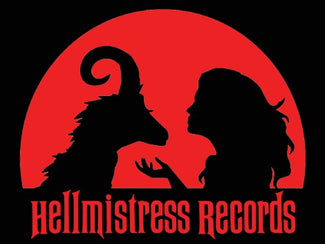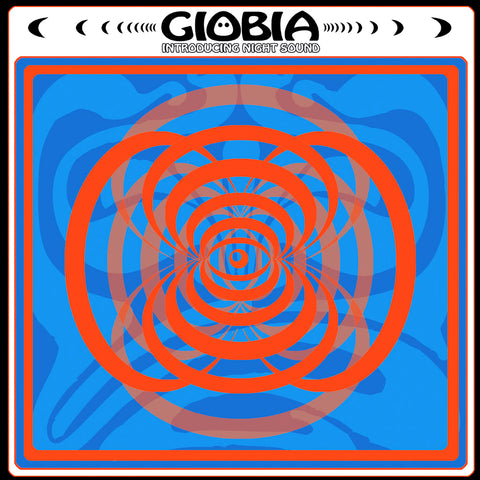Special Features: Limited to 500 copies on blue vinyl.
Tracklisting:
Side A
- Introducing Night Sound
- Can't Kill
- Karmabomb
- A Hundred Comets
Side B
- Orange Camel
- Are You Lovin' Me More (But Enjoy It Less)
- Electric Light
- No One to Depend On
- Silently Shadows
Release Date: July 20, 2016
Label: Sulatron Records
Origin: Germany
Because it’s so fluid and because the nature of the band’s sound sets up such a strong flow between the individual songs, it’s easy to listen to Introducing Night Sound, the third album from Italian psychedelic rockers Giobia, and not immediately get the full sense of how varied the tracks actually are. Though they seem most consistently at home somewhere between late-’60s psych-pop and more brash, stripped down garage rock, Giobia (also written Giöbia, with an umlaut), also work in an array of elements from post-rock and shoegazing experimental drones as well as space rock and even hints of New Wave-type progressive rhythms. This results in a wide berth for Introducing Night Sound(released by Sulatron Records), but to their credit, Giobia handle the turns expertly and with a consistent undercurrent of warm, analog tones and organ/synth, the album leaves an impression at once familiar for its classic aesthetic and individualized for the way it works within its style. The Milan-based foursome of Stefano Bazu Basurto (vocals, guitar, sitar, bouzouki), Paolo Detrji Basurto (bass), Stefano Betta (percussion) and Saffo Fontana (organ, synth, violin, vocals) are resoundingly cohesive, but songs like “Karmabomb” and the later Santana cover “No One to Depend On” still carry a loose sensibility to their swaggering groove, spanning decades in a matter of minutes and enacting, certainly in the case of the latter, a catchy pop drama that’s well met by Paolo‘s running basslines and a persistent build in Betta‘s drums. Introducing Night Sound can be moody, but it never fails to engage the listener and for an album that rests at a vinyl-ready 42 minutes, it provides a deceptively rich and lasting listening experience.
Psych is the order of the day right from the effects-driven beginning of the opening title-track, which mounts an immediate swirl of guitar and layers of synth, Stefano‘s vocals echoing out with a nonchalant kind of drawl as the music picks up in response. They waste no time holding back the groove, which is straightforward enough to ground the psych flourish and meandering sensibility of the instrumental midsection before the verse returns. In this way, the opener sets up some of Introducing NightSound‘s pulse — you might say it introduces it — but there’s no way the full scope could be captured within one song and have it actually work. Second cut “Can’t Kill” follows with an underlying swagger in its kick drum that’s offset by a soaking-wet psychedelic vibe, giving an alternate-universe coolness to the proceedings before the pace kicks up in the last minute to lead into the sitar-vibery of “Karmabomb,” never quite getting bombastic, but still managing to surprise. Post-rock guitar echoes and synth meet with tambourine-inclusive late ’60s groove, but the vocals, semi-spoken, contribute a more mod-ern feel. Nonetheless, the synth work in the middle is glorious and the complementing guitar only adds to the lush-but-natural appeal of the song, which is a highlight of the album, even though the subsequent “A Hundred Comets” introduces crunchier guitars and some of that Dead Meadow-type languidness that still strikes with a New Wave influence. At 6:27, “A Hundred Comets” is the longest track on Introducing Night Sound, and it wanders as one might expect, but Giobia never go farther than the song warrants, indulging a bit but not losing sight either of the song or their audience.
Side B commences with the janglier “Orange Camel,” touching on elements of dance music in its synth while panning channels in traditional psychedelic fashion and setting up the Electric Prunes cover “Are You Lovin’ Me More (but Enjoying it Less)” with a divergence from the verse/chorus structure of the earlier tracks but a steady continuation of the album’s linear flow and more dead-on organ from Fontana. Paolo‘s bass features heavily, but the guitar also keeps a steady presence, and moving into the exploratory garage rock of “Are You Lovin’ Me More (but Enjoying it Less),” it makes sense as a transitional piece. The same song — presumably a different recording — also appeared on Giobia‘s second album, 2010’s Hard Stories, and while I’m not sure why they’d include it on two separate albums, as I didn’t hear the last one, the fit is decent enough here, this cover and the aforementioned Santana cover sandwiching the ultra-groovy original “Electric Light,” which is organ-heavy and a little foreboding in the guitar, but still smooth as the instruments save for the synth and drones make way for Stefano’s vocal lines in the verse. There are shades of Vibravoid here, but Giobia never pick up into the same kind of rush that Vibravoid are so prone to, and even when “Electric Light” gets moving, it keeps the tempo steady amid the swirl, which comes all the more forward as the drums fade in the last minute and the song itself likewise makes its way out gradually, letting “No One to Depend On” do the work of regrounding Introducing NightSound, which it does thanks largely to Paolo‘s bass, though the overall progression is more straightforward even if the rest of the band finds room to space out within the original structure, once again touching on electronic dance in the beat of the song’s second half but burying it under a wash of analog-sounding effects.
When the guitars return to the fore, they do so with a fuzzier distortion, but the balance of the song isn’t upset at all, and “No One to Depend On” carries into the closer “Silently Shadows” with ringing tones and a jump right into a more brooding synth sprawl. Stefano’s vocals are far back with the drums, echoing behind the bass and keys, and as the song plays out, Giobia introduce the violin, layering Fontana over herself for a dramatic moment before the verse starts back in. There’s a different vibe to the closer, but by the time Introducing Night Sound gets through eight of its nine tracks, the band have established enough of a flow that there’s no real interruption to it. A quick fade at the end of “Silently Shadows” had me checking again to make sure there wasn’t something wrong with the CD, but short of a longer march out, Giobia would be hard pressed to cap the record more appropriately and still keep the stripped-down structural movement going. This being their third album, Giobia have a strong, clear vision for what they want their sound to be, but even not having heard their older material, I’m not sure what a cut like “Silently Shadows” or even “Introducing Night Sound” can stand for if not a continued drive toward developing their approach. That progressive mentality rests at the core of what they do, and it gives Introducing Night Sound an adventurous flair that a lot of modern heavy psych ignores in favor either of a full-on retro vibe or jamming out. Nothing against either, but Giobia are on a different wavelength, and it suits them. - The Obelisk (TheObelisk.net)
http://theobelisk.net/obelisk/2013/07/01/giobia-introducing-night-sound-review/

